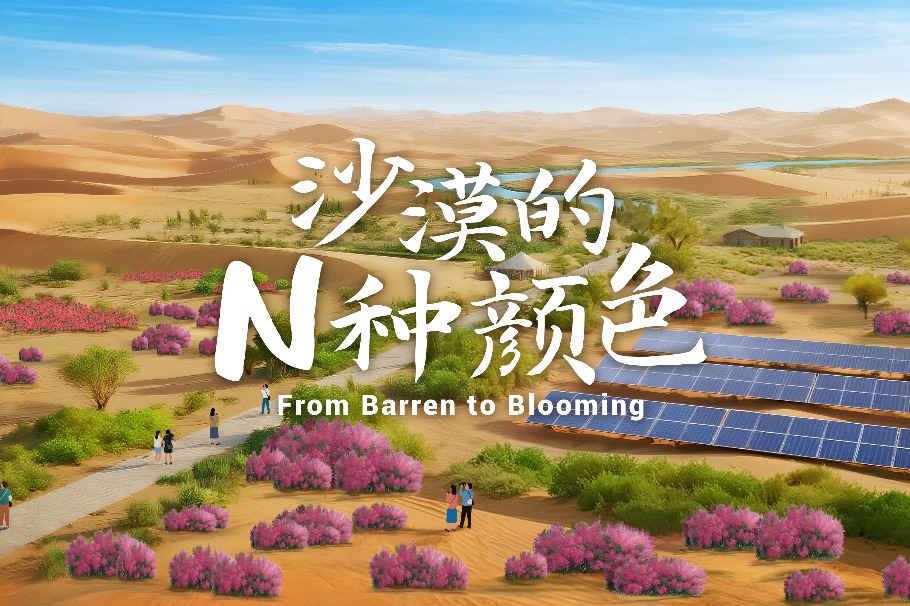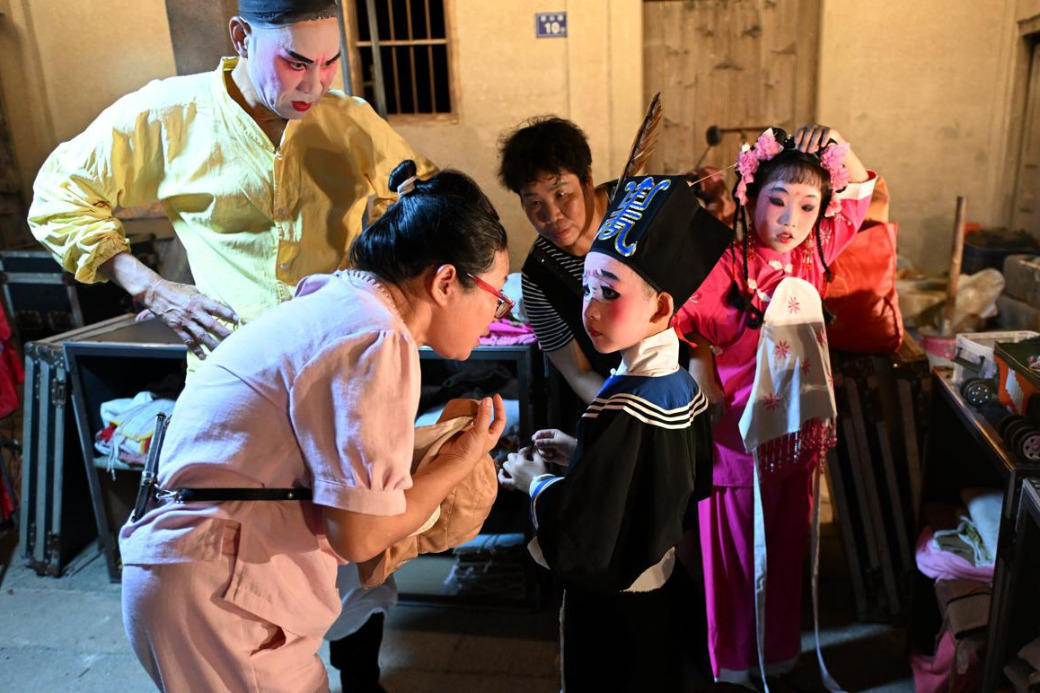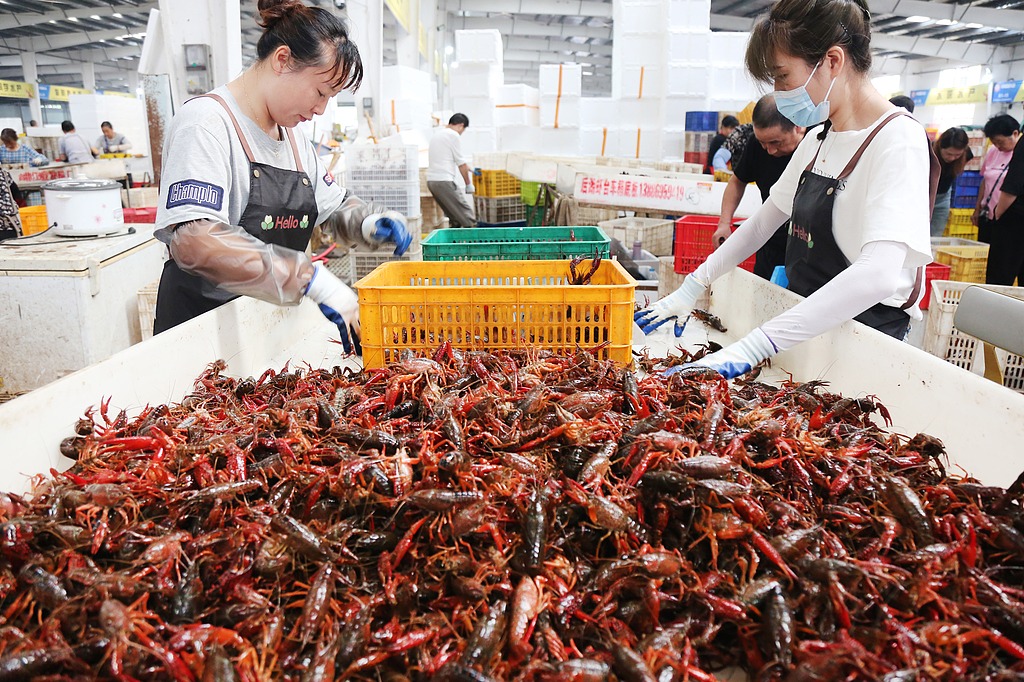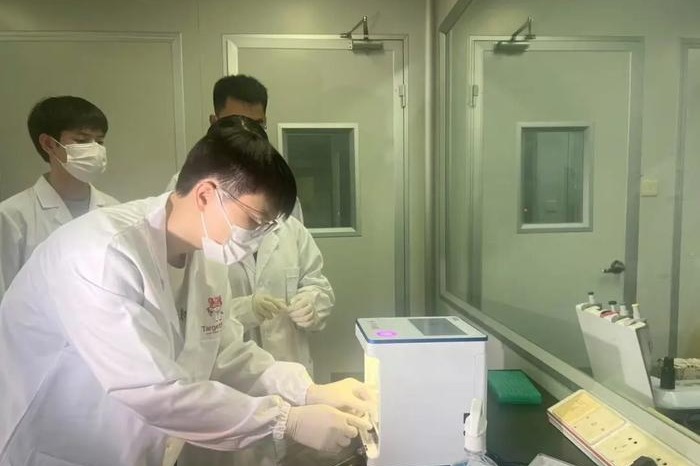Up close and personal
Smaller venues and productions are creating a more immersive experience for audiences, while still allowing the essence of traditional operas to shine, Chen Nan reports.

In a narrow lane about a kilometer away from the bustling commercial area of Xidan in downtown Beijing, where young people gather to dine at new restaurants and buy fashionable clothes, Star Theaters, a popular venue among drama fans, is a hub for audiences looking for smaller theatrical productions.
Behind its giant red door, it is home to three performance areas — each with a seating capacity of about 200. Pioneering theater talents try their bold ideas with a diversity of productions, allowing audiences to enjoy a fresh experience.
Now, Star Theaters is offering something old, yet experimental.
From October to November, the 10th Xiqu Opera Black Box Festival brings 21 performances covering nine kinds of traditional Chinese operas, such as Peking Opera, Kunqu Opera, Cantonese Opera and Qinqiang Opera.
"Traditional Chinese operas are ancient, mostly established centuries ago. Incorporating singing, poetry, acting, and martial arts, they are performed in local dialects, depending on where they originate, with librettos composed according to a strict set of rules that highlight form and rhyme," says Zhou Long, artistic director of the organizing committee of the festival. "Works of traditional Chinese operas tell stories of history, society and daily life. Traditionally, stage settings and props are kept to a minimum.
"During the past 10 years, some artists of traditional Chinese operas broke the frame of the old art forms, trying to present new and creative productions. The essence of traditional Chinese operas remains the same but they experimented by altering traditional conventions of space, movement, mood, tension, language, and other elements," says Zhou.
On Oct 11, to unveil the monthlong festival, eight award-winning actresses and actors of traditional Chinese operas gathered at Star Theaters to perform excerpts from classic pieces.
The following day, the festival premiered a one-act Peking Opera production, titled Waiting. Adapted from Waiting for Godot, Samuel Beckett's classic play, the production was directed and performed by Peking Opera actor Liu Dake.
Jingju, also known as Peking Opera, was listed as an intangible cultural heritage by UNESCO in 2010.
Within 90 minutes, four Peking Opera actors played multiple roles, breaking down the barriers of the characters and raising a lot of philosophical questions.
The production is open-ended, unlike traditional works of the genre. Since the space of the theater is small, there is little distance between actors and the audience, allowing the actors to build a conversation with viewers.
According to Liu, who performs with the China National Peking Opera Company and specializes in hualian roles (literally translated as "painted face", referring to actors playing male roles with striking looks and high social position), the idea of adapting Waiting for Godot into a Peking Opera production has been in his mind for years. He didn't figure out a way to present it onstage until he met Peking Opera actress Zheng Ziru, who is known for playing laodan, or older female roles.
"As the Beckett play's title indicates, the central act is waiting, and one of the most salient aspects of the play is that nothing really seems to happen. That part inspired me, especially after we experienced the COVID-19 pandemic. It seemed that all of us were waiting for something," says Liu.
From there, he started to adapt the play in early 2023 and with the support of three other performers, they finished the adaptation.
"Nearly all of the work was done in the rehearsal room. We improvised a lot, which is totally unlike the usual process of rehearsing a traditional Peking Opera," recalls Liu, adding that because Zheng lived in France for years, she also added French to parts of the dialogue.
On Sunday, the production will be staged at the recently reopened Beijing People's Theater.
Liu recalls that, back in 2005, he performed in a small production, titled Hamlet — The Revenge of Prince Zi Dan, adapted from Shakespeare's Hamlet by Shanghai Peking Opera Company. Along with the company, he traveled to Denmark to perform the Peking Opera production.
"That was the first time that I performed in such a small Peking Opera production. I had no idea what 'small' meant, only knowing that we had much fewer cast members and a simpler stage set. When we performed in Denmark, the applause from the audience was very warm, despite the language barrier," recalls Liu.
Since then, Liu has been performing in more small Peking Opera productions, such as Faust based on Goethe's masterpiece with the same title, which was coproduced by the China National Peking Opera Company and the Italian Emilia Romagna Theatre Foundation in 2015, and his one-man show based on Ernest Hemingway's The Old Man and the Sea.
"With a smaller cast and team, simpler stage sets and costumes, those productions bring lots of challenges for artists of traditional Chinese operas. The idea is bold but the root remains the same," says Liu.
According to Yang Fengyi, artistic director and head of the Northern Kunqu Opera Theatre, smaller theatrical productions of traditional Chinese operas encourage directors, scriptwriters and performers to help the audience to change their attitudes and aesthetic judgments about the old art forms.
She also mentions Ma Qian Po Shui, the first Peking Opera show staged at a small theater, which was directed by Zhang Manjun and premiered in 2000 by the Jingju Theatre Company of Beijing.
"Now, after decades-long development, making smaller productions has become a popular movement among Chinese theaters of traditional operas, as a way to attract new audiences and a platform to offer opportunities to young talent."
Red Bean, a new production by Wuxi Xiju Opera Theater, was scheduled to be staged during the festival, on Tuesday and Wednesday, as the first small theatrical production of Xiju Opera, a local opera form of Wuxi, Jiangsu province, with a history dating back to the Qing Dynasty (1644-1911).
Four actors and actresses from Wuxi Xiju Opera Theater played six characters in the production, which tells a tragic love story between a prince, Xiao Tong, during the Southern and Northern Dynasties (420-581) and a beautiful woman named Hui Ru.
One of the performers in the new production is Cai Yu, an award-winning Xiju Opera actress who heads the Wuxi Xiju Opera Theater. With a history going back to the 1950s, the theater decided to put on its first small production, and invited An Fengying to be the director.
"The theater has been devoted to preserving and keeping Xiju Opera alive, like many other theaters of traditional Chinese operas in the country. We want to attract a younger audience, so we decided to develop our first small production," says Cai.
"In Chinese culture, the red bean symbolizes romance between lovers. The story of Red Bean displays the beautiful singing and acting of Xiju Opera," she adds, noting that one of the performers is Xiju Opera actor Wang Ziyu, whose grandfather, Wang Binbin (1921-2008), was known as one of the leading actors of Xiju Opera. His singing style, known as binbin qiang, has been inherited by his son, Wang Jianwei, and now his grandson, Wang Ziyu.
Besides Xiju Opera, Wang Ziyu also learned Kunqu Opera — one of the oldest existing forms of traditional Chinese operas, with a history of more than 600 years.
"Wang Ziyu plays the role of the prince and the emperor. He switched between the two totally different characters within seconds onstage, which presented great challenges. There are two performers onstage without any lines," says An, who talks about the experimental elements featured in the production. "Though it is a tragic love story, the stage set is beautifully decorated with mirrors, which is something rarely seen in Xiju Opera productions."
Over a decade ago, An worked with Chinese theater director Li Liuyi, playing in Li's small theater productions, such as a trilogy portraying three female heroes, Hua Mulan, Mu Guiying and Liang Hongyu.
As she recalls, the experience allowed her to get to know small theaters, where new works were made for innovative live art.
Red Bean is An's first production for such venues. "It has strong emotions. I wanted to disrupt the relationship between audience and performer," says An, adding that, for actors and actresses, it is challenging to perform at such venues because all the performers' movements can be seen clearly by the audience.
According to a 2015 survey, there were 348 forms of traditional Chinese opera, a decline of about 60 from 1999.
"During the past 10 years, small theaters have made a great contribution to attracting a younger audience. It's true that traditional art forms are fighting to survive. We are glad to have such venues to help pave the way for old art forms to find new life," she says.


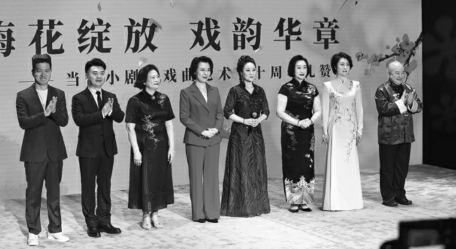
Today's Top News
- China urges the US to cease provocative actions
- Hope, skepticism and questions ahead of Trump-Putin summit
- Xi's article on promoting healthy, high-quality development of private sector to be published
- China's top diplomat urges Japan to learn from its warring past
- China-built roads bring real benefits to Pacific region
- Japan must face up to its wartime past


















